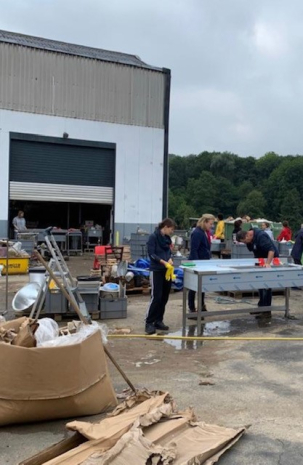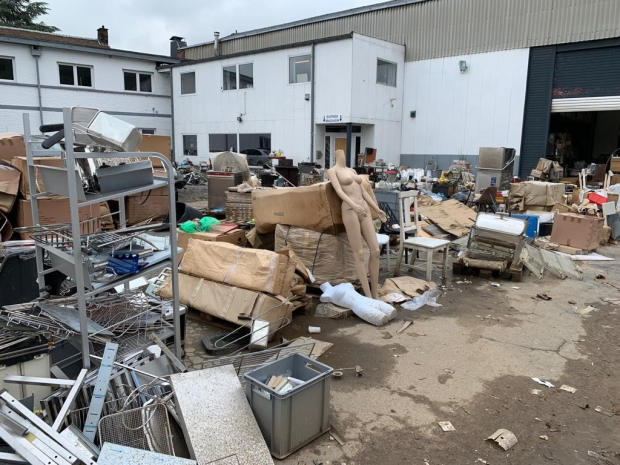UNEP staff help clean up post-flood waste in Liege
Discussion details
On 31 August, in an act of solidarity, UNEP Brussels Office staff joined a Belgian Red Cross coordinated clean up action in the Belgian Province of Liege, which was affected by deadly flooding in mid-July 2021.
“We decided to undertake a volunteer clean up action to show our solidarity with the people affected by these devastating floods,” said Veronika Hunt Safrankova who heads the UNEP Brussels Office and initiated this team activity. “It is an arduous task to clean up the area and the people here can use all extra hands offered to help them,” she said as she put on her rubber boots and descended onto the cleaning site.

Together with a dozen other volunteers, the team cleaned the remnants from a heavily damaged warehouse in the proximity of the city of Liege. At the site, they sorted and washed all sorts of household material that was plucked from the rubble in view of recovering as much as possible from it. By doing so they also helped reduce waste and support local enterprises to take up their economic activity again. Liege's rubbish-clearing service INTRADE estimates that the amount of domestic debris in eastern Belgium's floord affected region is close to 160.000 tonnes.
The cleaning site was located on the banks of the Ourthe river, a tributary to the river Meuse. In this area, the Ourthe had overflowed its banks countless meters between 12 and 15 July. Like in other affected parts of the country, this had led to major damage to infrastructure, housing, forced evacuations, and taken a heavy human toll.
According to Belgian newspaper Le Soir, Belgium lost 41 people to the mid-July flooding. Belgian Minister of Home Affairs, Annelies Verlinden, described the event as "one of the greatest natural disasters our country has ever known."
Scientists have attributed the widespread floods to the effects of human activity. These devastating floods which also struck parts of Germany, Luxembourg and the Netherlands, occurred just days before the release of a new report by the Intergovernmental Panel on Climate Change (IPCC). According to the IPCC, human influence on the climate system is undisputed, and human-caused climate change is the main driver of changes in weather extremes. According to the scientists, as temperatures rise, Western and Central Europe will be exposed to increasing extreme rainfall and flooding, something also confirmed by the World Weather Attribution.
Unfortunately, the heavy rainfall that triggered the catastrophic flooding in these western European countries, “is just the latest indicator that all nations need to do more to hold back climate change-induced disasters” points out the World Meteorological Organization (WMO) .

After a day of physical exertion, the UNEP colleagues headed home feeling humbled by the resilience demonstrated by the victims and by local volunteers they worked alongside with. They are determined that we can all do more to support them. “While we urge everyone to join the recovery and resilience efforts, we realise that this may not be feasible for everyone; nevertheless, one act of solidarity with the victims of the flooding, is relatively easy”, said Veronika, “by changing our lifestyle choices we can all help to support the global changes we need to combat climate change and achieve the Sustainable Development Goals.” We need to Act Now if we want to curb global warming and reduce the chances of more extreme weather events.
Log in with your EU Login account to post or comment on the platform.